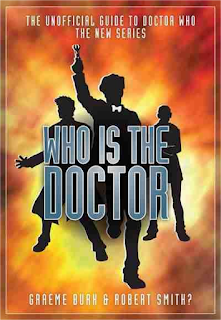Where I, Ron, blog on a variety of different subjects--social theoretical, historical, cultural, political, social ethical, the media, and so on (I got the Max Weber, the Mark Twain, and the Stephen Leacock in me)--in a sometimes Niebuhrian or ironic way all with an attitude. Enjoy. Disagree. Be very afraid particularly if you have a socially and culturally constructed irrational fear of anything over 140 characters.
Monday, 2 July 2018
The Books of My Life: Who is the Doctor
I started watching the BBC's Doctor Who way back in the 1970s when Jon Pertwee and Tom Baker, probably still my favourite Doctor, were the Doctors. I continued to watch as Peter Davison, Colin Baker, and Sebastian McCoy succeeded Tom Baker as Doctor Who. At first I was hesitant to watch the Doctor Who reboot that began in 2005, but once I started watching it I fell in love with the show, again, to my relief.
I just spent the last month and a half rewatching and watching, in the case of the episodes from series seven on, all of the episodes of the Doctor Who reboot. As a result I was looking for an episode guide like The Television Companion: The Unofficial and Unauthorised Guide to Doctor Who by David Howe and Steven James Walker (Tolworth, England: Telos, 2003). Unfortunately, Graeme Burk's and Robert Smith's Who is the Doctor: The Unofficial Guide to Doctor Who the New Series (Toronto: ECW, 2012) is not it.
I found Who is the Doctor interesting, enlightening, eye rolling, and frustrating all at the same time. The summary sections for each episode are far too short. The reference sections raise questions about whether these references are emic, etic, or both raising the question, in turn, of whether references, if they aren't derived from primary source information, are valid. Some seem valid, others seem of questionable validity. Still others may have been ignored because not all references seem to have been derived from primary source analysis. The adventures in time and space sections were generally helpful particularly when they connected the reboot to the Classic Series, episodes of which I haven't seen since the 1970s and 1980s. The who is the Doctor sections are helpful. The stand up and cheer sections are interesting if largely subjective, which may or may not be a problem for some. The roll your eyes sections were likewise subjective and, as a result, were problematic, for me, given that they are sometimes grounded in a notion of realism that is not really an appropriate or valid "criticism" of a fictional television show. They were, for me, of the same variety and validity as those academic criticisms of Disney's Pocahontas (1995), which was not intended to be a historical documentary, as not being historically accurate enough. The trivia sections were OK. The opinion and second opinions sections were interesting but were often undermined, as is so often the case with fan criticism, by the assumption that the authors could have written better episodes than those who actually did write the episodes did making one wonder why they aren't writing each and every episode of Doctor Who. The psychic paper segments do a good job of exploring the similarities and differences between new Who and old. The biographies are far too brief.
Methodologically, I am more of an exegesis, hermeneutics, and homiletics sort of guy. In my book one must began with a critical analysis of a text, an exegesis of the text grounded in primary source material, with a summary of the text that is long enough to do it justice to it. Only then can one move on to hermeneutics or the interpretation of the text, to an exploration of what we think a text means on the basis of our exegesis. And only then can we finally move on to homiletics, to polemicising or engaging in apologetics over a text. Burk and Smith too often, it seems to me, start and end their "critical" analysis at the homiletic level and that is, at least for me, a problem.
Methodology isn't the only problem with Burk's and Smith's book. Their "criticisms" of Doctor Who's ethnic and racial lack of representation smacks of the same crystal ball tendency (the assumption and circular logic that you can learn anything you need to know about a text from the text itself) in much academic criticism these days that focuses exclusively on the text and largely jettisons any first order or primary source analysis of a television show or film. The book ends with series 6 while Doctor Who is now at series 11 making some of Burk's and Smith's "criticisms" problematic given that Doctor Who remains an open text.
As a result of all this, I will continue my search for a book on the new series of Doctor Who that is more like the Howe and Walker book, a book which seems to me, even with its faults, to be one of the best episode guides I have ever seen and read.
Subscribe to:
Post Comments (Atom)

No comments:
Post a Comment